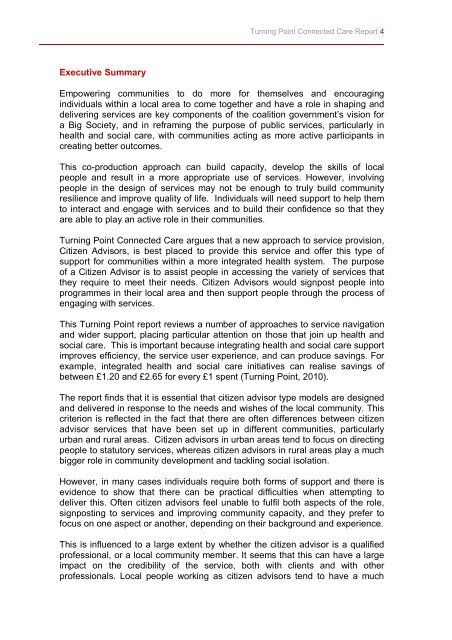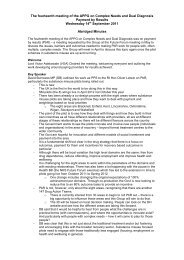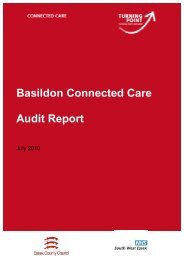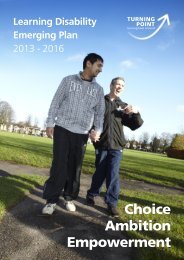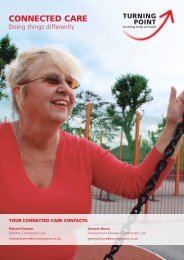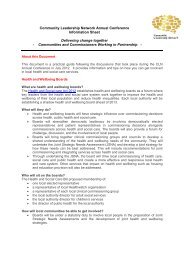Citizen Advisors - Turning Point
Citizen Advisors - Turning Point
Citizen Advisors - Turning Point
Create successful ePaper yourself
Turn your PDF publications into a flip-book with our unique Google optimized e-Paper software.
<strong>Turning</strong> <strong>Point</strong> Connected Care Report 4<br />
Executive Summary<br />
Empowering communities to do more for themselves and encouraging<br />
individuals within a local area to come together and have a role in shaping and<br />
delivering services are key components of the coalition government’s vision for<br />
a Big Society, and in reframing the purpose of public services, particularly in<br />
health and social care, with communities acting as more active participants in<br />
creating better outcomes.<br />
This co-production approach can build capacity, develop the skills of local<br />
people and result in a more appropriate use of services. However, involving<br />
people in the design of services may not be enough to truly build community<br />
resilience and improve quality of life. Individuals will need support to help them<br />
to interact and engage with services and to build their confidence so that they<br />
are able to play an active role in their communities.<br />
<strong>Turning</strong> <strong>Point</strong> Connected Care argues that a new approach to service provision,<br />
<strong>Citizen</strong> <strong>Advisors</strong>, is best placed to provide this service and offer this type of<br />
support for communities within a more integrated health system. The purpose<br />
of a <strong>Citizen</strong> Advisor is to assist people in accessing the variety of services that<br />
they require to meet their needs. <strong>Citizen</strong> <strong>Advisors</strong> would signpost people into<br />
programmes in their local area and then support people through the process of<br />
engaging with services.<br />
This <strong>Turning</strong> <strong>Point</strong> report reviews a number of approaches to service navigation<br />
and wider support, placing particular attention on those that join up health and<br />
social care. This is important because integrating health and social care support<br />
improves efficiency, the service user experience, and can produce savings. For<br />
example, integrated health and social care initiatives can realise savings of<br />
between £1.20 and £2.65 for every £1 spent (<strong>Turning</strong> <strong>Point</strong>, 2010).<br />
The report finds that it is essential that citizen advisor type models are designed<br />
and delivered in response to the needs and wishes of the local community. This<br />
criterion is reflected in the fact that there are often differences between citizen<br />
advisor services that have been set up in different communities, particularly<br />
urban and rural areas. <strong>Citizen</strong> advisors in urban areas tend to focus on directing<br />
people to statutory services, whereas citizen advisors in rural areas play a much<br />
bigger role in community development and tackling social isolation.<br />
However, in many cases individuals require both forms of support and there is<br />
evidence to show that there can be practical difficulties when attempting to<br />
deliver this. Often citizen advisors feel unable to fulfil both aspects of the role,<br />
signposting to services and improving community capacity, and they prefer to<br />
focus on one aspect or another, depending on their background and experience.<br />
This is influenced to a large extent by whether the citizen advisor is a qualified<br />
professional, or a local community member. It seems that this can have a large<br />
impact on the credibility of the service, both with clients and with other<br />
professionals. Local people working as citizen advisors tend to have a much


